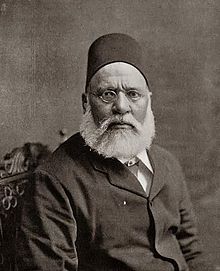Battle of the Sinai
| Battle of the Sinai | |||||||
|---|---|---|---|---|---|---|---|
| Part of Urabi' Revolt | |||||||
 Urabi' Pasha, leader and initiator of the Urabi' Revolt, based on his namesake. | |||||||
| |||||||
| Belligerents | |||||||
|
|
| ||||||
| Commanders and leaders | |||||||
|
|
| ||||||
| Strength | |||||||
| 6,500 men, 35 guns | 12,000 men, 40 guns | ||||||
| Casualties and losses | |||||||
| 1,200 killed, 750 wounded, 200 missing | 8,350 killed, 2,100 wounded, 560 missing, rest captured | ||||||
The Battle of the Sinai was a military engagement between British forces under the dual command of William V and Sir Garnet Wolseley against Egyptian rebels led by Ahmed 'Urabi Pasha, a disgruntled former Egyptian officer.
Background
Since the usurpation of the Muhammad Ali dynasty in Egypt by Muhammad Ali Pasha, a former Ottoman military commander, the Egyptian realm had went various reforms and developments based on European fashion. This was exemplified by Muhammad Ali and Ibrahim Pasha's successors, as they gradually expanded the territorial size, and economy of Egypt. However, all these achievements was primarily done based on loans lent to by the European governments, particularly those of France and the United Kingdom.
Urabi' Revolt
With overwhelming European control and influence over Egyptian affairs, rampant corruption and disaffection grew among the local population. Eventually, Ahmed Urabi', who had been a former Egyptian officer spearheaded a massive insurrection against the Europeans in Egypt and against the government of the Egyptian Khedive Tewfik Pasha.
The insurrection proved initially successful due to the large support for Urabi' Pasha among the population and the Egyptian army itself. Soon enough, Tewfik Pasha alongside his loyalists were forced to flee to safety. While in exile, Tewfik Pasha personally wrote a letter to the British king William V, pleading for help.
British intervention
As violence and anarchy spread throughout Egypt, the king successfully convinced ed British Parliament into voting overwhelmingly in favour of intervention, on the basis of the security of the majority Christian population in Alexandria and foreign interests. As a result, a sizable army of 35,000 men, complete with 85 guns are tasked under the king and the esteemed Sir Garnet Wolseley, while a squadron of 45 Royal Navy ships were put under Admiral Seymour's command. However, upon recommendation by the Prime Minister, an ultimatum was initially forwarded to Urabi' in order to potentially avoid any further conflict.
On the 5th of June, Seymour's fleet begin bombarding the coastal city upon Urabi' Pasha's drastic measure of rejecting the ultimatum and exacerbating tensions, which lasted for around 4 hours before the remaining rebel soldiers forcibly retreated inwards to Cairo
Afterwards, the 35,000 strong army was equally divided into 7 smaller regiments with specifically assigned commanders while the Royal Navy fleet patrolled the Egyptian coast.
Wolseley's Nile River Campaign & Battle
While William's regiment marched for Cairo, Garnet's regiment however was tasked to cut off Urabi's supplies from the south. For a period of 2 and a half months, Garnet's forces, largely assisted by the Abyssinian regiment managed to swiftly overwhelm the Egyptian defences at Asyut, Al Minya and Al Fayyum while taking in minimal casualties.
With William's army group approaching Cairo, Urabi' Pasha chose to flee eastwards to the Ottoman border, out of fear of being surrounded. Soon enough, William ordered his men to hunt down the rebel leader while leaving a sizable detachment overseeing Cairo.
By early January of 1882, Urabi's forces had found themselves critically depleted of resources while demands for the Ottoman government to intervene proved skeptical, largely due to the internal dilemma and British persuasion.
As both forces refused to directly the engage the other in open combat, Seymour was then ordered to direct his fleet to seize Port Said, another strategic port. Upon its execution, the desperate forces of Urabi' was forced to drastically engage the British, with their only exit through the Ottoman border already denied.
Despite being relatively outnumbered on a 1:2 scale, the British forces were far more prepared and thanks to a timely intervention by Garnet's forces and the undisputed effectiveness of the famed Abyssinian regiment, the Egyptian rebels were soundly defeated.
Death of Urabi' Pasha
Amidst the chaos, having sensed inevitable defeat, Urabi' Pasha and a few of his remaining loyalists hastily took off from the battlefield, desperately attempting to seek refuge from the neighbouring Ottoman Empire. However, this was shortly noticed by Captain James Pott, whom in retaliation led a small company of 500 soldiers to hunt down the rebel leader and his escaping loyalists.
Following a half and hour chase through the desert plains, the two sides engaged each other in a short skirmish where in the end, most of Urabi' Pasha's men were killed alongside Urabi' himself, who was shot in the chest by Pott himself. The remaining rebels were swiftly apprehended and later sentenced to prison alongside the others.
Aftermath
With the destruction of a major rebel force and the death of Urabi' himself, the rebellion steadily lost ground with the last remnants of the rebels at Al Ghardaqah finally surrendering after a month long siege. Effective authority was effectively restored just 2 months after the battle.